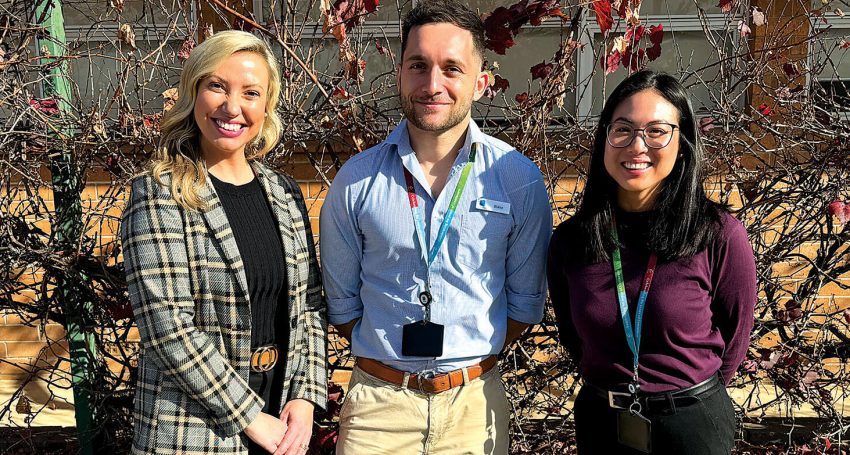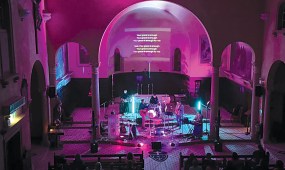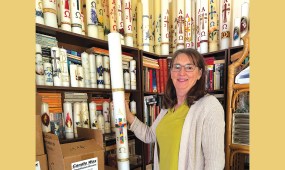Supporting young carers
Local
Centacare Catholic Community Service’s Young Carer Support Services (YCSS) team hear the words “I just want my kid to be a kid" regularly.

It’s the reason the program, which celebrates its first anniversary in July, exists.
The small but dedicated team comprises program manager Jessica Hickey and young carer coordinators Nelly Tai and Blake Schiphorst. The trio works hard to provide guidance to young people who are in an unpaid caring capacity.
“There’s a high demand for the service and we see lots of really great engagement and great outcomes for young people,” Jessica says. “We work alongside the whole family to make sure they’re connected in with schools and other services.”
Advertisement
One of the major hurdles is a widespread misunderstanding of the definition of ‘young carer’. According to the YCSS program, a young carer is an individual aged five to 25 who provides personal care, support and/or assistance to a family member or loved one who has a disability, a mental illness, frailty due to age or dementia, a long-term or terminal health condition, or an alcohol or drug related concern.
A young carer’s role can involve helping someone with cleaning and chores, working part-time to pay bills, managing finances, shopping, dressing and bathing, keeping their loved one company, looking after their family, translating or signing, and lifting or carrying heavy items.
“There is a barrier for young people from multicultural backgrounds to realise they have a caring role,” Nelly says. “They often think, ‘I’m just the brother, I’m just a sister, I’m just the daughter and this is what we do. Sometimes a family may be in Australia by themselves, with no extended family members to support them so they all pitch in because that’s how family works. We understand that, so let them decide how they want to access the service.”
Due to the nature of a young carer’s role, personal challenges include emotional and psychological pressure, reduced participation in social and recreational activities, disengagement from education,
and financial stress.
The wide spectrum of situations means no workday is the same for YCSS team members.
“We try to be very client-led so we work out what a client wants to get out of it,” Blake says. “Our program is voluntary, so they don’t have to stay in if they don’t want to. A lot of people who come in are interested in wanting to get some kind of outcome.”
For young children, an outcome could be as simple as having time away from their caring role to go out and kick the soccer ball. Acquiring a library card, applying for assistance and grants, or assistance with general wellbeing is also common.
“Teenagers are usually keen to get a job, so we help them with resume writing, and organising bank accounts and tax file numbers,” Blake says. “When putting together a resume, some of them don’t even realise how useful the skills they already have are. Sometimes our job is just saying, ‘What do you do to help your loved one? What job do you know doesn’t involve cleaning, organisational skills, prioritising tasks, or the empathy and compassion you show a family member?”
Advertisement
Clients who are already employed sometimes need support to help build towards what they want to achieve in life. “And how to access additional support and other services they might not quite know how to reach themselves,” Blake says. “We meet with young carers in schools, in their homes or in the community, wherever works for them. Things like transport can be a big barrier for a lot of people, and that can be down to anxiety around things like catching public transport. For us to be able to offer that ability to go into homes means we’re able to meet that person’s needs.”
For Nelly, the chance to have a positive impact on a young person’s life is deeply fulfilling. “I’m a people person so social work really spoke to me,” she says. “Reaching into different resources and then using our knowledge to support a young person and try to improve their wellbeing just makes sense to me.”
One of Nelly’s clients supports a parent with mental health concerns. “This young person became a young carer because their mum is experiencing severe social anxiety, to the point where their mother is not able to go to the post office, do banking or go to the doctor’s office, so the young carer has to take a younger sibling to appointments,” Nelly says.
They also have to take time off from school to support their parent. This impacts on the young person’s wellbeing and school engagement.
“So, in our work together, we talked about how this person is unable to meet school demands such as homework and attendance. Together, working with a school counsellor, we were able to come to a resolution in to how to support the young person in the caring role, while also balancing that with their school life.
“We turned their caring role into a project which means they could achieve their SACE credits. Part of what we do is advocating for the young carer, so counsellors and teachers know what life is like for them outside of school.”
During school holidays, YCSS also runs school holiday events for young carers aged five to 25 and hosts social events allowing young carers to connect with others in similar situations.
“Knowing that we’re able to work on practical, achievable things with young people is wonderful,” Nelly says.
“Some are even excited about receiving library cards. Yes, it’s free and all you need to do is sign up for one but to them, it’s magical because it’s independence.”
The YCSS program can support clients for up to 12 months. Young carers can self-refer or be referred by family members and friends, or other service providers. They must also live
in northern Adelaide metropolitan, or Barossa, Lower Light north areas and can’t be registered with National Disability Insurance Scheme (NDIS)
For more information, visit centacare.org.au







